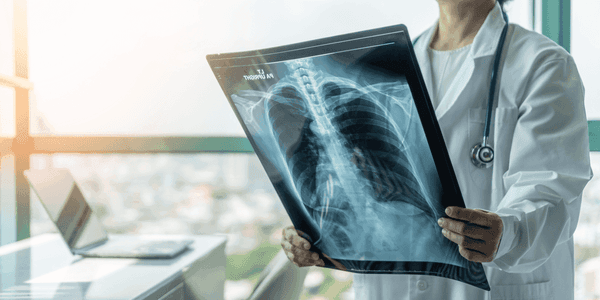![Healthy Matters]() Pharmacist Tips | Dosages | Side effects
Pharmacist Tips | Dosages | Side effects![Healthy Matters]() Nutritionist Tips | Facts | Precautions
Nutritionist Tips | Facts | Precautions![Healthy Matters]() Practitioner Tips | Dosages | Side effects
Practitioner Tips | Dosages | Side effects![Healthy Matters]()
![Healthy Matters]()
X-Ray: How It Works? Options & Costs in Hong Kong
4 min read

X-ray scan uses ionizing radiation to form 2D images of your body. It has many applications, including screening for bone problems and detecting tumors. CT scan and DEXA are other techniques that are based on X-rays. Scroll on to understand the procedure, applications and risks of X-ray scanning.
What is an X-ray?
X-ray is a type of electromagnetic radiation that can be absorbed by different body parts with different densities at different rates. Denser parts like hard tissues (bones and teeth) and tumors allow a lower amount of X-rays to pass through, while less dense parts like soft tissues (e.g. blood, skin, fat and muscle) allow more X-rays to pass through. This imaging technique uses a detector to pick up the radiation that passes through the body and generate black-and-white images of the bones, tumors and other structures within the body.
Why do I need an X-ray scan?
X-rays are useful in helping doctors diagnose a body condition and monitor the progression of the disease. X-ray is commonly used to screen for conditions including:
Bones and teeth
- Bone fractures
- Arthritis
- Tooth decay
- Osteoporosis
- Scoliosis
- Bone cancer
Chest
- Lung problems, e.g. pneumonia, tuberculosis or lung cancer
- Breast cancer
- Congestive heart failure and blocked blood vessels
Abdomen
- Digestive problems
- Foreign objects
Apart from its diagnostic application, X-ray can also be used to assist doctors and surgeons during certain procedures, for example, to guide a catheter along an artery during coronary angioplasty.
What should I expect from an X-ray scan?
Preparation
X-rays require no prior preparation in most cases, except if deemed necessary by the doctor, a contrast agent may be given to patients by injection, ingestion or enema to show soft tissues more clearly on the image, e.g. barium is used to highlight the digestive system and iodine is used to highlight blood vessels. Fasting may be required if you are having an X-ray on your digestive tract.
Also, you should:
- Wear loose comfortable clothing, as you may be asked to undress or change into a hospital gown for the body part to be examined under X-ray.
- Avoid wearing any clothes or accessories with metal parts, such as zips, buckles and screws in the eyeglasses.
- Inform your doctor if you have metal implants, which are likely to block X-rays and interfere with the images.
X-ray is radioactive and may increase the risk of birth defects. It is very important to inform your doctor or radiologist if you know or you suspect you are pregnant.
During the X-ray
During the X-ray procedure, you must stay still to avoid blurring the image. Sometimes, you may be instructed to hold your breath. Young children may be given restraints to hold them in positions. An X-ray scan is non-invasive and lasts for a fraction of a second only, but the whole process can take up to a few minutes as X-ray images may be taken at different angles.
Sometimes, you may be given a lead apron to shield the other parts of the body from radiation.
After the X-ray
X-ray exams should not have any aftereffects. However, if you have taken a contrast agent for the test, you may want to drink plenty of water to expel it as soon as possible.
Your doctor/ radiologist will explain your X-ray examination result to you when it is ready and proceed with the next steps if treatment is necessary.
Risks of X-ray
It is a common concern that exposure to radiation such as that of an X-ray will lead to cell mutations and cancers. However, the examined body part is only exposed to a low level of radiation for a fraction of a second. Generally speaking, an X-ray of your chest, extremities or teeth is equal to the amount of natural background radiation in a few days, with the risk of causing cancer being less than 1 in 1,000,000, according to Public Health England. An X-ray exam will only be recommended when its benefits outweigh its risks.
Pregnant women
Most X-ray scans, particularly those on legs, head, teeth or chest, do not expose your reproductive organs to direct X-ray beams, and you can wear a lead apron to shield them from radiation scatter.
Abdominal X-rays exposing your fetus to direct X-ray beams may cause harm if the amount of radiation exposure is high. Extreme high-dose radiation exposure within the first two weeks following conception may cause a miscarriage. 2 to 8 weeks after conception, high-dose radiation may heighten the risk of fetal growth restriction or birth abnormalities. Between weeks 8 and 16, exposure may increase the likelihood of developing a learning or intellectual disability.
That said, exposure to the normal dose of a single diagnostic X-ray is significantly lower than the dosage associated with these issues. But to be safe, tell your doctor before having an X-ray if you are or may be pregnant. Your doctor may advise you to postpone the X-ray examination, lower the dosage or consider other non-radioactive examinations (such as ultrasound).
Costs of an X-ray scan in Hong Kong
In the public sector, X-ray examinations are usually performed at a public hospital's radiology department and are charged as private services. Depending on the region of examination, fees range from HK$210 to $6,860 per test.
Be aware that in the public sector, waiting times can be extremely long. In an extreme case, the waiting time for a mammogram (X-ray scan of the breasts) can be up to 2 years.
In the private sector, you may visit any of the 13 private hospitals in Hong Kong, private clinics or imaging centers for an X-ray scan. Based on our research, the cost can range from HK$230 to over $1,400 per examination, depending on the body parts involved. Please contact your service provider for the exact pricing and appointments.
Are X-rays covered by insurance?
When prescribed by a medical doctor and used to make a diagnosis for treatment, X-ray expenditures are reimbursed in Hong Kong. However, most Hong Kong local plans have an annual cap and depending on the actual fees, you may have to pay any outstanding balance out of pocket. High-end medical plans, meanwhile, are more likely to pay X-ray expenditures in full with no sublimits. Read your health insurance table of benefits for these categories: Diagnostic scans and tests, Brain and Body scans, Diagnostics, or Advanced Medical Imaging. Contact an Alea advisor at [email protected] if you have any health insurance questions.
X-ray can be used to reveal disease or a developing health condition in hard tissues like bone and teeth and detect tumors in the body.
The risk of getting cancer from an X-ray scan is minimal as the normal radiation dosage should be as low as a few days’ worth of background radiation.
You should remain still during the scanning to avoid blurring the image.
This article was independently written by Healthy Matters. It is informative only and not intended to be a substitute for professional medical advice, diagnosis or treatment. It should not be relied upon for specific medical advice.

Your health resource, made in Hong Kong
Healthy Matters is Hong Kong’s leading health resource. Our mission is to help you make better health decisions and take control of your health.
Our team of experts is committed to producing reliable health content that is accurate, engaging and relevant, to cover your health & wellness journey from prevention to treatment.
Whether you are looking for trusted information on health conditions, wellbeing or looking for the right doctor or service in Hong Kong, we’re here to help!
Your health matters. Begin your health journey with Healthy Matters today!




























